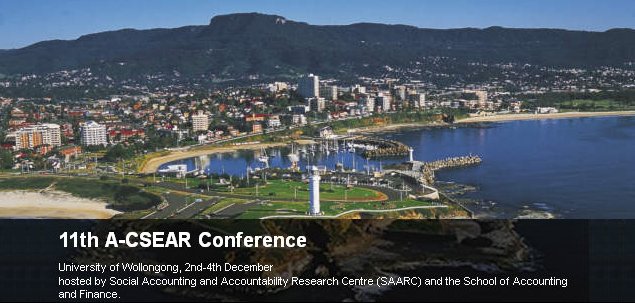Location
Bld 67.202
Start Date
4-12-2012 11:00 AM
End Date
4-12-2012 11:30 AM
Description
Purpose: - This research aims to understand the factors driving sustainability reporting practices in selected South Australian local councils and to investigate what these councils are reporting as sustainability issues, in the absence of any mandatory reporting guidelines. Research Design: - The study is orientated towards a qualitative research approach aligning with the case study method and uses new institutional theory as the theoretical framework. The research focuses on four selected South Australian local councils (i.e. metropolitan, metropolitan fringe, regional and rural council) and uses interviews and content analysis of 2010-11 annual reports to explore the sustainability reporting practice in these councils. Findings:- The South Australian state strategic plan is the most influencing factor (quasi-coercive isomorphism) that drives most councils to adopt sustainability reporting practices. In addition, evidence of normative isomorphism and mimetic isomorphism factors are also identified in the study. The study showed presently there is no separate or standalone sustainability reports published by any council but elements of sustainability issues are reported in the annual report and in all cases these disclosures are comparable with the Global Reporting Initiative’s (GRI) Sector Supplement for Public Agencies (SSPA) guidelines.
Influences on Sustainability Reporting Practices in Selected South Australian Local Councils: An Explanatory Case study
Bld 67.202
Purpose: - This research aims to understand the factors driving sustainability reporting practices in selected South Australian local councils and to investigate what these councils are reporting as sustainability issues, in the absence of any mandatory reporting guidelines. Research Design: - The study is orientated towards a qualitative research approach aligning with the case study method and uses new institutional theory as the theoretical framework. The research focuses on four selected South Australian local councils (i.e. metropolitan, metropolitan fringe, regional and rural council) and uses interviews and content analysis of 2010-11 annual reports to explore the sustainability reporting practice in these councils. Findings:- The South Australian state strategic plan is the most influencing factor (quasi-coercive isomorphism) that drives most councils to adopt sustainability reporting practices. In addition, evidence of normative isomorphism and mimetic isomorphism factors are also identified in the study. The study showed presently there is no separate or standalone sustainability reports published by any council but elements of sustainability issues are reported in the annual report and in all cases these disclosures are comparable with the Global Reporting Initiative’s (GRI) Sector Supplement for Public Agencies (SSPA) guidelines.


